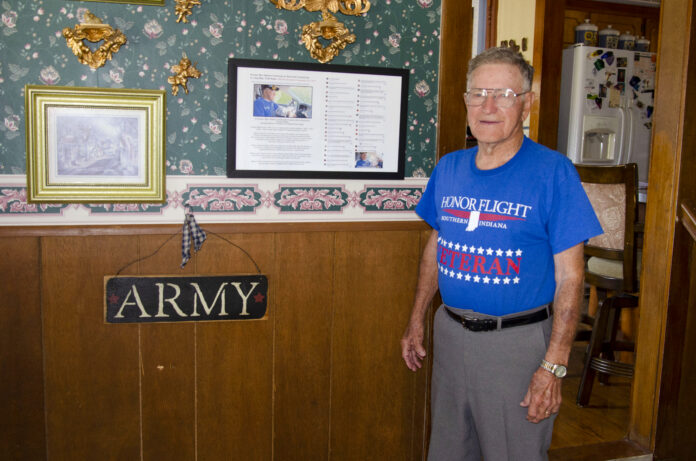By Don Steen ~ Staff Writer • reporter@psci.net
George Meece, 93, has seen a lot of history in his life. Indeed, his family heritage traces back to Josiah and Elizabeth Crawford, neighbors, friends, employers, and mentors to the young Abraham Lincoln. While Lincoln’s rendezvous with history culminated in the war of the blue and the gray, Meece’s early life took him to a very different civil war.
In the aftermath of World War II, the newly liberated Korean Peninsula was divided between Soviet and U.S. occupation zones. Both zones established their own governments, broadly following the lead of their sponsors. After abortive attempts at peaceful reunification, punctuated by years of skirmishes, rebellions, and guerrilla activity, the communist Korean People’s Army of the north launched an overwhelming offensive at dawn on June 25, 1950. In one of the early tests of the nascent United Nations, the U.S. and its allies committed forces to preserve South Korean sovereignty.
By 1953, the draft was weighing heavily in the United States. The conflict had long stalled into a ceasefire on and around the pre-war borders at the 38th parallel, but new recruits were still needed.
Meece had graduated from Richland Luce Township High School, and like many young men, was following the cycles of farm life. For some time, he had lived with the uncertainty of whether he would be spending the spring planting fields or training for war. By 1952, he decided to join the U.S. Army of his own accord, and on his own terms.
“I knew I was going to get in there anyhow,” said Meece. “If I joined then I could be in basic training during spring and summer, not during the winter.”
Sent for training at Fort Riley, Kansas, Meece had a choice of which schools to specialize in. That choice would turn out to make a world of difference for his military experience.
“I took any school I could get, so I went to Leadership School,” he said. “Just as sure as I’m sitting here, that school sent me to Korea. If I hadn’t went to that school I’d have probably went to Germany. That’s life.”
He left the states two days before Christmas, and would mark the New Year at sea. Like many young soldiers from the heartland, the first big shock of being shipped off to war is just that. Meece wound up spending more than a month stuck on a ship, across the Pacific and ultimately back home.
“That’s a long time to be on a dang boat,” he said. “Nothing to see but water, and it was rough.”
His first stop was Japan, still under American occupation and less than a decade removed from the devastating fire bombings of the last war. Meece said that the Tokyo that greeted him had come a long way, fitting every definition of modern and the scars of war fading.
From there he was sent to the south of Japan, where he trained as a combat engineer. Specifically, Meece was slated for laying down telephone and telegraph wires, repairing them when damaged, and managing communications with front-line units.
He arrived in Korea through the Port of Busan, a city around which South Korean and United Nations forces waged a desperate holding action only two years prior. At that time, North Korea had effectively seized the entire peninsula. The arrival of the United States and allied forces turned the tide, almost overrunning North Korea in turn. The entry of the People’s Republic of China into the war had turned the tide yet again, with the front stabilizing in the mountainous middle of the country.
Meece’s company made its home in those mountains, never more than a couple miles from the front lines. The U.S. Army had learned hard lessons earlier in the war. A sudden offensive can quickly isolate both front-line and support units, so keeping regular contact and providing updates on enemy movement was critical.
“I had an office dug out in a hill on a mountain,” said Meece. “The switchboard and telegraph operation was all out of that mountain hole.”
The terrain wasn’t particularly helpful. One key duty of combat engineers was installing pontoon bridges to replace those destroyed by artillery and air strikes. Between the mountains and rivers, any road or crossing could not be allowed to sit closed for long.
The same could obviously be said for communications. Units along the front line had to check in every hour, and someone had to be present to receive them. If a line was damaged, it had to be repaired immediately. If the battlefront changed, the lines had to be moved accordingly.
Meece noted that his training had prepared him to climb telephone poles to string wire, but this practice was never followed. Rather, engineers tended to lay their lines along the ground, for reasons that officers recognized and accepted.
“Up there somebody would off you,” said Meece. “Never did climb a pole.”
While never formally trained, Meece also started to pick up on the codes used to relay messages from the front. Meece picked up enough through the job to fill the role when needed. He’d have been trained for this, had not the Army realized that the war’s end was on the horizon.
Read more on this story in this week’s issue of the Spencer County Leader!
Featured Image: George Meece proudly stands next to his memory wall devoted to his service in the Korean War

George Meece proudly shows off a framed article about him and his time in the army, along with several supportive messages from various friends






